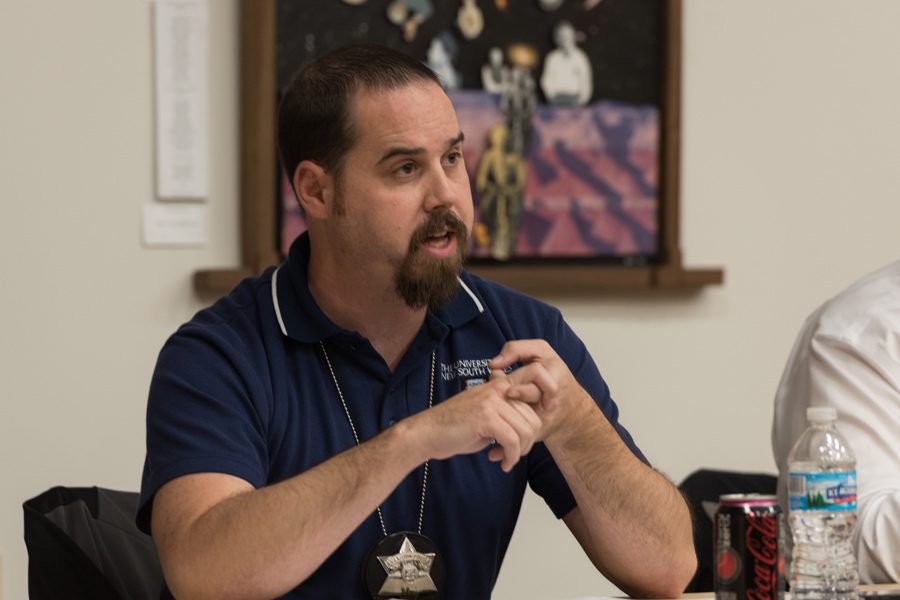Evanston police officers discuss drugs, gangs at town hall
Allie Goulding/Daily Senior Staffer
Detective Christopher Tortorello speaks at an Evanston Police Department town hall at the Lorraine H. Morton Civic Center on Thursday. Tortorello and two other officers talked about drugs, gangs and unsolved homicides.
November 10, 2017
Evanston Police Department officers discussed policies and procedures related to drugs and gangs during a Thursday town hall meeting.
The meeting, held at the Lorraine H. Morton Civic Center, was the second in a series of townhalls EPD is hosting. Two upcoming panels will discuss social media, crime prevention and community policing as well as rights, responsibilities and reasonability in Evanston, according to a news release.
Gilo Logan, a professor at Northeastern Illinois University and an EPD consultant, moderated the discussion. He said the panel was a result of the community asking for more information about drugs and gangs after a town hall last year.
“Officers in the police department felt that this information would be valuable and beneficial to the community because we all realize that it’s a partnership from the community, and (to) the Evanston Police Department to help resolve these issues in the community,” Logan said.
Detective Christopher Tortorello, one of the panelists, said Evanston updates its gang database list every five years, and that officers do thorough research to check if those on the list have had contact with gangs.
Because gangs were heavily policed in the 1980s, many of them now exist without a hierarchy or structure, leaving the opportunity for more conflict, Tortorello said.
Statistically, however, violent crime is down in the city, Evanston police Cmdr. Ryan Glew said.
Tortorello said the decrease is due in part to the department’s gun recovery efforts.
“In September 2015, Special Operations was directed by the chief of police to focus hours, at least a two-man unit everyday, on gun recovery and violence reduction,” Tortorello said. “This led to a recovery of numerous handguns, numerous arrests and overall the publication of these arrests.”
Evanston resident Madelyn Ducre, who attended the event, said she is concerned about the fairness of policing — especially around racial profiling — as well as the help that people get once they leave prison and return to Evanston.
She said if the police department fixes some of these issues, it would eventually need fewer officers.
Austin Spillar, a member of Citizens Network of Protection — a group dedicated to police reform and civilian oversight — said he came to the panel because he realized the need for more people to voice their opinions and ask questions.
Spillar said many of the issues the panelists talked about, including drugs and gang databases, can be fixed by instituting a civilian oversight board.
“Obviously there’s some things we need to dive into more,” he said. “One of those issues was the gang database list. It’s frankly disconcerting that it’s only updated every five years and (from) what I hear it can be a relatively low standard to get on a gang database list.”
Though there was a smaller turnout than at the first panel, Evanston police Cmdr. Joseph Dugan said it is good to foster conversation between residents and officers.
“We’re always open,” Dugan said. “(Conversation is) always good, even if it’s a sensitive topic or a topic that might not be flattering to the police department. There’s always room for improvement.“
Email: [email protected]
Twitter: @sn_handler


